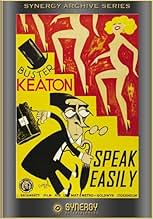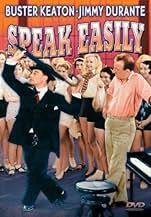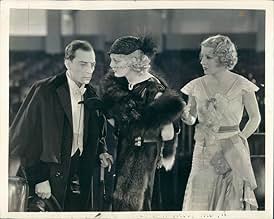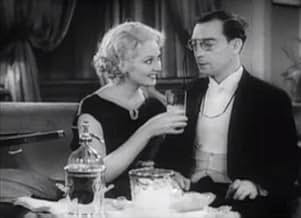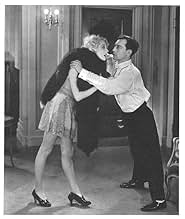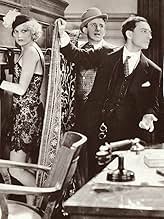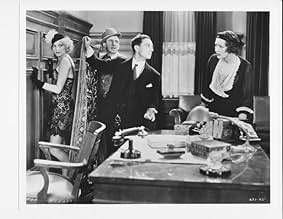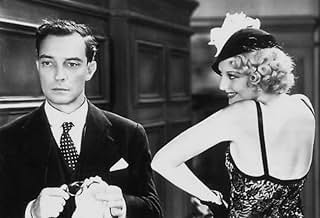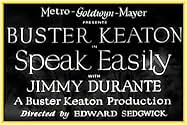IMDb RATING
5.8/10
1.2K
YOUR RATING
A timid professor inherits a large sum of money and decides to fund a terrible musical.A timid professor inherits a large sum of money and decides to fund a terrible musical.A timid professor inherits a large sum of money and decides to fund a terrible musical.
Loretta Andrews
- Chorus Girl
- (uncredited)
Oscar Apfel
- Lawyer's Representative
- (uncredited)
Reginald Barlow
- Billington
- (uncredited)
Jack Baxley
- Tom - Sheriff's Deputy
- (uncredited)
Sidney Bracey
- Jenkins
- (uncredited)
Jim Farley
- Station Agent
- (uncredited)
DeWitt Jennings
- Sheriff of Lincoln County
- (uncredited)
Fred Kelsey
- Process Server
- (uncredited)
- Director
- Writer
- All cast & crew
- Production, box office & more at IMDbPro
Featured reviews
I watched 'Speak Easily' one night and thought it was o.k., but missing something. Maybe Buster Keaton strangely speaking threw me off, or the labored line delivery of a leading lady. The next day I kept thinking about the movie, though. I couldn't get Durante's song out of my head, I kept trying to better remember Thelma Todd's first scene, I considered that maybe Keaton did do some funny falls and physical comedy. The next night I watched a scene with Thelma Todd as a conniving chorus girl trying to impress Buster and Jimmy with her sex appeal. A very funny scene, the actors excellent, their faces, their eyes, their silly expressions. So I watched another scene, their show is opening on Broadway. Buster in his blissful innocence botches every act. Again, I was laughing out loud, appreciating Keaton's clowning and tumbling. So the next night I watched the whole movie again, and this time I see it for the first time: It's Stupendous! It's Sensational! It's Sublime! Three great comedians! Todd dances! Durante sings! Keaton speaks! Sure it ain't poifect...but there's a lot of laughs in this picture.
Thelma Todd brings burlesque to a script replete with gags, some of them funny, as when Keaton carries her folded up looking like a filled bag. Pre-Code license pervades and Todd takes this to new realms. The Broadway show as conceived is quite brilliant with snow flakes, costumes, sets, dancers, music, balloons and genuine art, for a few moments, before Keaton tears it all apart. The Producers, Night at the Opera, owe somewhat. You don't get such a steady stream of sight gags and stunts, as with the trains, unless it's Keaton. Not many big laughs, but surprising in its disregard for conventions of good taste audiences might expect to see lived up at an MGM movie. Hedda Hopper does a great job as the tasteful Mrs. Peets.
Not laugh out loud funny, by still mildly amusing and lighthearted tale of an introverted professor whose supposedly inherited a fortune and decides to bankroll an inept broadway play until his fortune attracts the attention of a tenacious gold-digger (Todd).
Keaton's antics are subdued here appearing as the straight man to Durante's comic antics, whilst there's ample support from future 'Charlie Chan' Toler as the besieged stage director, and vivacious Thelma Todd as the would-be wife who sees an opportunity to secure acting fame and fortune via the cashed-up Keaton. Their drunken apartment liaison is probably the film's highlight, elsewhere proceedings sometimes become tedious and trivial despite a straightforward plot.
Mild romantic comedy doesn't become too ambitious, playing the formula sufficiently well to entertain despite some occasional pacing problems, 6/10.
Keaton's antics are subdued here appearing as the straight man to Durante's comic antics, whilst there's ample support from future 'Charlie Chan' Toler as the besieged stage director, and vivacious Thelma Todd as the would-be wife who sees an opportunity to secure acting fame and fortune via the cashed-up Keaton. Their drunken apartment liaison is probably the film's highlight, elsewhere proceedings sometimes become tedious and trivial despite a straightforward plot.
Mild romantic comedy doesn't become too ambitious, playing the formula sufficiently well to entertain despite some occasional pacing problems, 6/10.
Despite what other users have said about this movie, I found it delightful and very funny. Buster Keaton plays a college professor who thinks he has become a rich man. He decides to invest money in a bad show because he likes one of the girls in the show, and he takes the show to Broadway. Buster Keaton has a very nice speaking voice, and this is the first "talkie" of his that I have seen. Of note also in the film is Thelma Todd. She plays a golddigger, but her performance is very funny and holds up today just as well as it did then. The scene where she and Keaton get drunk I found hysterical.
What is the most harrowing movie ever made? The gynaecological nightmare of 'Cries and Whispers'? The acid psychodramas of Fassbinder? The discomfiting black comedy of 'Last House on the left? I'm sure for that portion of the film-loving public that tie their masts to the good ship Buster Keaton, there is only one answer - any one of his sound films.
I don't know what flayed my soul more poignantly in this movie - the grounding of Keaton's intricate and expansive physical art to humdrum slapstick; the painful hesitation of this master filmmaker with dialogue - not that he hasn't a lovely, comic voice, or that he can't make dialogue funny; it's just that the studio don't seem to have given him enough takes, and so he seems to be trying to remember his lines before he delivers, which only makes him - Keaton, not his character, look silly; or is it the humiliation of seeing Keaton caught up in a tawdry sex farce, when he has given us some of the richest accounts of romantic frustration in film?
No, I know what was most disturbing - having to watch Buster Keaton, cinema's greatest comedian, sit aside to observe Jimmy Durante doing his schtick. It is horrors such as this that get yer Dantes composing yer Infernos.
MGM seem to have got the curious idea that the best way to adapt Keaton to sound was to turn him into a Marx Brother, complete with verbal pedantry, elaborate, tedious 'clowning', shambolic slapstick, theatrical setting, triumph through chaos, and Thelma Todd. Keaton was just not that sort of comic, and where Groucho's malicious tongue and gleeful opportunism might just have made this plot work, Buster's socially inept professor can't, he is too studied and predictable.
What Buster needed was to be allowed experiment like Lang in 'M', or Rene Clair; he would never have tried to hold back the tide like Chaplin. When a film like 'The General' is alluded to - messing about with trains - the loss becomes even more apparent.
And the thing is, in patches amid the flat direction, the film isn't all that bad - there is an excellent jolt when a camera on the bus leaves Keaton alone at a railway station; and the denouement, if hardly original, is at least livelier than what went before. There is something almost endearing about the way Keaton slows down a plot that needs all the zip it can get.
There is a film in here about loneliness, emotionally paralysing order, the numbing effects of education etc., struggling to get out. The best way to appreciate this film is to watch not the narrative of Professor TZ Post, but of emasculated genius Buster Keaton, trapped in a prison of mediocrity, confounded by new technology, mocked by a malevolent fate (in this case the studio), retaining a stoical grace. Looked at like that, it becomes a kind of masterpiece.
I don't know what flayed my soul more poignantly in this movie - the grounding of Keaton's intricate and expansive physical art to humdrum slapstick; the painful hesitation of this master filmmaker with dialogue - not that he hasn't a lovely, comic voice, or that he can't make dialogue funny; it's just that the studio don't seem to have given him enough takes, and so he seems to be trying to remember his lines before he delivers, which only makes him - Keaton, not his character, look silly; or is it the humiliation of seeing Keaton caught up in a tawdry sex farce, when he has given us some of the richest accounts of romantic frustration in film?
No, I know what was most disturbing - having to watch Buster Keaton, cinema's greatest comedian, sit aside to observe Jimmy Durante doing his schtick. It is horrors such as this that get yer Dantes composing yer Infernos.
MGM seem to have got the curious idea that the best way to adapt Keaton to sound was to turn him into a Marx Brother, complete with verbal pedantry, elaborate, tedious 'clowning', shambolic slapstick, theatrical setting, triumph through chaos, and Thelma Todd. Keaton was just not that sort of comic, and where Groucho's malicious tongue and gleeful opportunism might just have made this plot work, Buster's socially inept professor can't, he is too studied and predictable.
What Buster needed was to be allowed experiment like Lang in 'M', or Rene Clair; he would never have tried to hold back the tide like Chaplin. When a film like 'The General' is alluded to - messing about with trains - the loss becomes even more apparent.
And the thing is, in patches amid the flat direction, the film isn't all that bad - there is an excellent jolt when a camera on the bus leaves Keaton alone at a railway station; and the denouement, if hardly original, is at least livelier than what went before. There is something almost endearing about the way Keaton slows down a plot that needs all the zip it can get.
There is a film in here about loneliness, emotionally paralysing order, the numbing effects of education etc., struggling to get out. The best way to appreciate this film is to watch not the narrative of Professor TZ Post, but of emasculated genius Buster Keaton, trapped in a prison of mediocrity, confounded by new technology, mocked by a malevolent fate (in this case the studio), retaining a stoical grace. Looked at like that, it becomes a kind of masterpiece.
Did you know
- TriviaSecond of three films in MGM's pairing of Buster Keaton and Jimmy Durante as a comedy team. The other pictures were The Passionate Plumber (1932) and Le roi de la bière (1933).
- GoofsWhile Professor Post (Buster Keaton) is dragged by the train, clutching his luggage, his hat flies off and he is unable to grab it. In the next shot, his hat is once again firmly on his head.
- Quotes
Eleanor Espere: Tell me, Timmy. Have you ever seriously thought of marriage?
Professor Post: Yes... that's why I'm single.
- ConnectionsFeatured in Il était une fois Hollywood (1974)
- SoundtracksGood Times Are Here Again
(1932) (uncredited)
Music by David Snell and Charles Maxwell
Lyrics by Samuel Marx
In the score during the opening credits and at the end
Played on piano by Jimmy Durante and sung by the chorus at the opera house
Played often in the score
Details
- Release date
- Country of origin
- Language
- Also known as
- Les millions qui tombent du ciel
- Filming locations
- Chatsworth Depot, Chatsworth, California, USA(train station)
- Production company
- See more company credits at IMDbPro
- Runtime
- 1h 22m(82 min)
- Color
- Aspect ratio
- 1.37 : 1
Contribute to this page
Suggest an edit or add missing content

